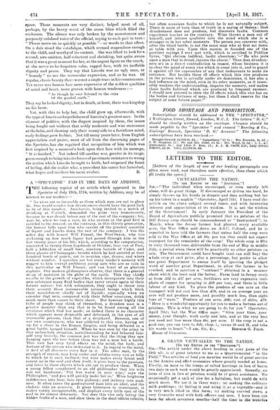T A "SPECTATOR" FAD IN THE DAYS OF ADDISON. HE following
reprint of an article which appeared in the Spectator of July 19th, 1714, written by Addison, may be of interest to our readers:- " No vices are so incurable as those which men are apt to glory in. One would wonder how drunkenness should have the good luck to be of this another. Anacharsis, being invited to a match of drinking at Corinth, demanded the prize very humourously, because he was drunk before any of the rest of the company; for, says he, when we run a race, he who arrives at the goal first is entitled to the reward; On the contrary, in this thirsty generation, the honour fulls upon him who carries off the greatest quantity of liquor and knocks down the rest of the company. I was the other day with honest Will Funnel, the West-Saxon, who was reckoning up how much liquor had passed through him in the last twenty years of his life, which, according to Ms computation, amounted to twenty-three hogsheads of October, four tun of Port, half a kilderkin of small beer, nineteen barrels of Cyder, and three glasses of Champagne; besides which he had assisted at four hundred bowls of punch, not to mention sips, drams, and whets without number. 1 question not but every reader's memory will suggest to him several ambitious young men who are as vain in this particular as Will Funnel, and can boast of as glorious exploits. Our modern philosophers observe, that there is a general decay of moisture in the globe of the earth. This they chiefly ascribe to the growth-of vegetables, which incorporate into their own substance many fluid bodies that never return again to their former nature.; but with submission, they ought to throw into their account those innumerable rational beings Which fetch their nourishment chiefly Out Of liquids; especially. when we consider that men, compared with their fellow'creatures, drink much more than conies to their share. But however highly this tribe of people may think of themselves, a drunken man is a greater monster than any that is to be found among all the creatures which God has made; as indeed there is no character which appears more despicable and deformed, in the eyes of all reasonable persons, than that of a drunkard. Bonosus, one of our own countrymen, who was addicted to this vice, having set up for a share in the Homan Empire, and being defeated in a great battle, hanged himself. When he was seen by the army in this melancholy situation, notwithstanding he had behaved him- self very bravely, the common jest was that the thing they saw hanging upon the tree before them was not a man but a bottle. This vice has very fatal effects on the mind, the body, and fortune of the person who is,devoted to it. In regard to the mind, it first of all discovers every flaw in it. The sober man, by the strength of reason, may keep under and subdue every-vice or folly to which he is most inclined; but wine makes every latent seed sprout up in the soul and shew itself; it gives fury to the passions, and force to those objects which are apt to produce them. When a young fellow complained to an old philosopher that his wife was not handsome; ' Put less water in your wine,' says the Philosopher, and you will quickly make her so.' Wine heightens indifference into love; love into jealousy; and jealousy into mad- ness. It often turns the good-natured man into an idiot; and-the choleric into an assassin. It gives bitterness to resentment, it makes vanity insupportable, and displays every little spot of the soul in its utmost deformity. Nor does this vice only betray the
i
hidden faults of a man, and shew them in the nireatodioha Colours, but often occasions faults to which he is not naturally subject. There is more of turn than of truth in a saying of Seneca : that drunkenness does not produce, but discovers faults. Common experience teaches us the contrary. Wine throws a man out of himself, and infuses qualities into the mind which she is a stranger to in her sober moments. The person you converse with, after the third bottle, is not the same man who at first sat down at table with you. Upon this maxim is founded one of the prettiest sayings I ever met with, which is ascribed to Publius Syrus, Qui ebrium ludificat, laedit absentem; He who jests upon a man that is drunk,injures the absent.' Thus does drunken- ness act in a direct contradiction to reason, whose business it is to clear the mind of every vice which is crept into it, and to guard it against all the approaches of any that endeavours to make its entrance. But besides these ill effects which this vice produces in the person who is actually under its dominions, it has also a bad influence on the mind, even in its sober moments, as it insen- sibly weakens the understanding, impairs the memory, and makes those faults habitual which are produced by frequent excesses. I should now proceed to shew the ill effects which this vice has on the bodies and fortunes of men; but these I shall reserve for the subject of some future paper."


























 Previous page
Previous page